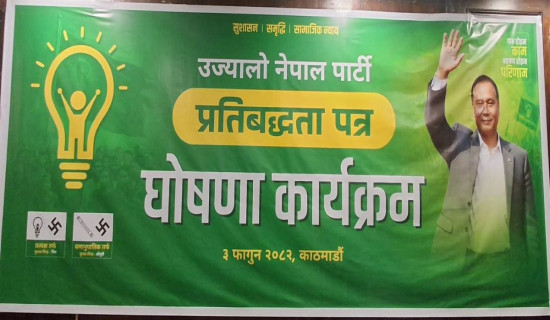- Sunday, 15 February 2026
Understanding Democratic Socialism
Shyam Prasad Mainali
Socialism in communism is a command economic system. In this system, individuals get equal shares and opportunities as the government adopts centralised planning. Resources are distributed or allocated based on individual and societal needs. The government fully controls national resources and economic production which means individuals depend entirely on the state for food, employment, health services, and more.
The government itself determines the amount of output, supply and pricing of all services and goods. Individual properties and national resources are all under public control.
Competitive nature
Democratic socialism can be interpreted as an economic system under which individuals, through a democratically elected government, are offered an equal share of economic production. They share opportunities for labour, entrepreneurship, capital goods, and natural resources. In democratic socialism, all people naturally want to cooperate, but the competitive nature of capitalism becomes an obstacle.
While capitalism emphasises the prosperity of individuals, democratic socialism is more concerned with the well-being of society. Its destination is the clear transformation of society from capitalism to socialism through the participatory democratic process. Revolution, as characterised by orthodox Marxism, is not accepted by this ideology. Housing, utilities, mass transit, and healthcare services are distributed by the government, while consumer goods are distributed by a capitalistic free market run by healthy competition.
These two terms are often used interchangeably. However, economic, and political theories are different. The terminology arose from the protest against the exploitation of the labour class during the industrial revolution. Most modern countries oppose capitalism to provide equal shares and opportunities to all citizens without discrimination.
Key differences between the two are the pattern of resource distribution and property held. Both advocate a higher standard of living for every person based on ownership. Whilst communism allocates resources according to the need of the individual, democratic socialism emphasises the need and contribution of the individual.
Class and religions are completely abolished in communism, whereas the class emphasis is given to diminishing the differences and religious freedom are exercised in democratic socialism. Both belong to left-wing schools of economic thought discarding a capitalistic economy. Socialism is more permissive than pure communism. Communism believes in the transfer of power to the working class by revolution with drastic changes, but democratic socialism emphasises gradual changes compatible with democratic norms and standards.
Democratic socialism itself is a strain of socialism which permits capitalism to exist but addresses inequality through progressive policy intervention and government-run social programmes.
Democratic socialism encompasses that government should provide basic needs to all citizens at a reduced cost. It attaches greater priority to social security schemes for the welfare of the citizens and does not leave the unemployed, the poor, the homeless and the old people as high and dry as in capitalism. Social democracy places full employment, higher production, raising standards of life, social security and fair distribution of income and property above the interests of private profit. Trade unions and organisations of producers and consumers are necessary elements in a democratic society. Both the economic system differs in objectives and structures of production. Public officials regulate trade, the flow of capital, and other resources. Some countries adopt a hybrid model known as a mixed economy.
Our constitution proclaims "Nepal as an independent, indivisible, sovereign, secular, inclusive, democratic, socialist-oriented, federal democratic republican state." Since its inception, the main motto of the Nepali Congress remains ‘democracy, socialism and nationalism.’
All parties are theoretically committed to socialism which is reflected in the present constitution and their respective manifestoes. However, their actions are contradictory to their ideological commitments. Vital sectors deeply connected with macro-level economy and public life have been assigned to the private sector which has incentivised profit.
Governments at different times in Nepal have completely ignored generating employment, leaving many of those of working age to find opportunities abroad. Cultural diversity, family, and community values, and indigenous and self-knowledge are some useful assets for building a Nepali model of social democracy. It is highly essential to guarantee social and economic justice in the Nepali society.
In the 21st century, countries have displayed their commitment to socialism for attaining sustainable development. All democracies agree that freedom, social justice, solidarity, and peace are an important basis for socialism. Theoretically speaking, everyone is equal under socialism but in practice, hierarchies do emerge, and party officials and well-connected individuals find themselves in better positions to receive favoured goods and services.
Communism and socialism advocate public control of the means of production, although socialism allows for the continued existence of capitalism in some parts of the economy. Socialists may or may not see a communist system as their end goal.
Practically, socialists may not strictly follow the economic or social systems associated with pure socialism. Instead, most countries considered socialist employ policies of democratic socialism. Scandinavian countries such as Norway, Sweden and Denmark can be cited as an example.
Being democratic countries, they ensure free health care, education, and lifetime retirement income which are funded by some of the world's highest tax rates. Obscene wealth hoarding is less prominent within this model. Cuba, North Korea, and China also claim to be socialist nations with full government control of the national economy.
Hybrid model
If governments are committed to socialism, they should work strictly to ensure that 95 per cent employment is guaranteed. The agricultural sector needs to be commercialised, and specialised agro goods are essential. Through the effective materialisation of progressive policies and programmes, the government should enforce democratic control on the excessive accumulation of wealth at the hands of a few self-interested people. Neither communists nor democratic countries have become successful in treating their citizens equally through socialism. Many countries have accepted the hybrid economy model in the name of socialism.
(Mainali is a former government secretary.)

















